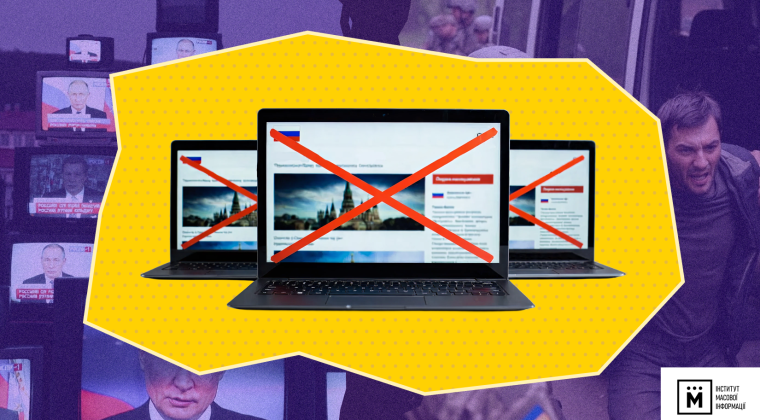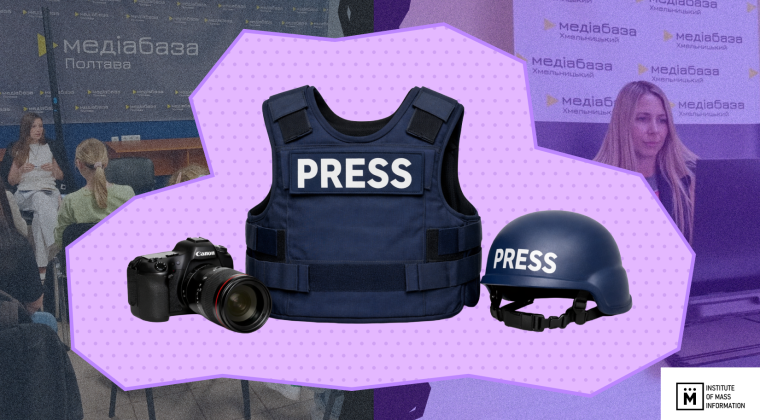The global media treated the Russian missile strike on the children’s hospital Okhmatdyt in radically different ways. It was the most important event of the day for the British media, while for US outlets and journalists in other countries a rocket hitting the facility where Ukrainian children were being treated was background noise, concluded the experts of the Institute of Mass Information after reviewing the websites of world media.
WHEN CHILDREN SUFFER
“They beat up our children!” – this was the indignant cry that drove a million Ukrainians out to protest in 2013 following the attack on students by the police on Independence Square (Maidan). At that time, the entire world admired the Ukrainians’ zeal in their confrontation with the authoritarian pro-Russian government, and the world’s most influential media were covering the developments of the Revolution of Dignity.
At the onset of Russia’s large-scale invasion, the war in Ukraine was top news in the world media every day, with hundreds of outlets sending their correspondents here. However, over time, the interest in the war began to wane, and Ukraine news took a back seat.
When on the morning of July 8, 2024, Russian missiles hit Ukraine’s largest children’s hospital “Okhmatdyt” and other civilian objects in the capital, Dnipro, and Kryvyi Rih, Ukrainians united again. Hundreds and thousands of people in Kyiv rushed to the hospital, where a missile destroyed one of the buildings and damaged the surrounding ones. Just like 11 years ago, everyone wanted to help in any way they could: some were digging through the debris, some were helping the victims, some were simply bringing the necessities and water.
Once again, trouble brought a bunch of strangers together as they formed a real “anthill” on the hospital’s premises. This “anthill” cleared out the rubble and debris from broken windows and battered buildings. The Maidan atmosphere reigned in “Okhmatdyt”. People quickly formed chains, passing still-hot bricks along. These chains included doctors who had been performing surgeries on chidlren only an hour before, pretty women with recently done nails, men who were too young to enlist, and special forces policemen – former officers of the ‘Berkut’ unit, which was opposing the protesters at the Maidan in 2013. All of them were united by the thought of yet another crime committed by the Russians: “They fired at our children!”
When these people came home in the evening, they were surprised to learn that the missile strike on the largest children’s hospital in Ukraine was B-tier, if not C-tier, news for multiple world media.
“The global media do not even want stories soaked in the blood of Ukrainian children, because they are bored of them,” says Ukrainian journalist Iryna Storozhenko, sharing her impression of Western outlets on Facebook. To her post, she attached screenshots of 15 world media websites, concluding that only Reuters framed the attack on “Okhmatdyt” as top news. “The rest either did not report on it, or posted it as some tenth news piece in the feed,” writes Storozhenko.
On the morning of July 9, the president of the American Chamber in Commerce in Ukraine, Andriy Hunder, posted the first pages of six fresh newspapers on Facebook. They contained photos of the Okhmatdyt strike afterhmath.
“All of them are British newspapers. I hope that the American mass media also had it on the front pages”, commented deputy Yevhenia Kravchuk under Hunder’s post. She is the deputy head of the ruling faction “Servant of the People” and the deputy chair of the Parliamentary Committee on Humanitarian and Information Policy.
Kravchuk’s comment is rather diplomatic, but the message between the lines is there: there was a gulf between the British and US media in terms of the Ukraine coverage. Having reviewed multiple global media outlets, IMI analysts came to this conclusion as well. A case in point is The Washington Post. The news about the targeted missile strike on the children’s hospital was stuffed into the lower third section of the website. An Okhmatdyt building being destroyed by a missile was not even reported in a separate news story, but mentioned in a few lines in the report on Viktor Orban’s visit to China. One of the most influential newsrooms in the USA and the world perceived and described Russia’s missile attack on a children’s hospital as if it were written by some intern in a student newspaper. When Ukrainians see such an attitude towards the grief and pain of their children, all the Pulitzer Prizes won by WP journalists no longer matter. Whenever people do mention them, it is only with one wish: that the American newspaper burns its Pulitzers.
Below is a more detailed review of how the global media covered the missile attack on the “Okhmatdyt” hospital.
THE WASHINGTON POST
The mention of the missile attack on “Okhmatdyt” entered the news under the headline “With Viktor Orbán in China pushing ceasefire, Russian missiles slam Ukraine.” The authors listed are Christian Shepherd and Gerry Shih, with the former working on the article from Taipei and the latter from New Delhi. The editors also acknowledged Serhiy Korolchuk in Kyiv, Kate Brady in Berlin and Natalia Abbakumova in Riga as contributors.
The news made it neither to the top or to the second tier section. To find it, you need to scroll down for a while – the article is in the lower third of the home page.
The article was mostly about Orban’s visit to China. The lead mentions that at that time “Russian missile strikes hit a children’s hospital in Kyiv.” Within the text, the missile hitting “Okhmatdyt” is mentioned in the 4th paragraph, and then once again in the 27th paragraph. Overall, only four paragraphs out of 29 touch on the Ukraine missile strike, while the rest are about international talks and reactions to these talks.
The news mentions the number of casualties, a quote from Zelensky’s Telegram about the damage to residential buildings and a children’s hospital. It also quotes the response by the Russian Ministry of Defense on Telegram that the targets were “Ukraine’s military industry objects” and “airbases”.
The news came out at 6:00 a.m. ET, and was rewritten later at 5:28 p.m. After editing, the text became two paragraphs shorter, the mention of the missile strike was moved up to the second paragraph, and the responses by Zelensky and Russia’s Ministry of Defense were moved from the end of the article to the beginning – the third and fourth paragraphs, respectively. Instead, the mention of the Russian strike disappeared from the headline altogether, and now the news headline is as follows: “With Orbán in China and Modi in Russia, Putin’s multipolar world takes shape”.
THE NEW YORK TIMES
The New York Times’ top news on July 8 was the US election. The news about the missile strike on “Okhmatdyt” had to take a back seat.
On the website, the article was posted under the headline “Russia Strikes Children’s Hospital in Deadly Barrage Across Ukraine“. The report also got into the printed newspaper on July 9: in the printed version, it had the headline “Russian Strike Levels Children’s Hospital in Kyiv” and was placed on the front page and page 8.
The article was penned by Marc Santora and Brendan Hoffman, the former writing from Odesa and the latter from Kyiv, Hoffman also being the one taking photos on the ground. Eric Schmitt, Aric Toler, Nataliia Novosolova and Dzvinka Pinchuk are credited as contributors.
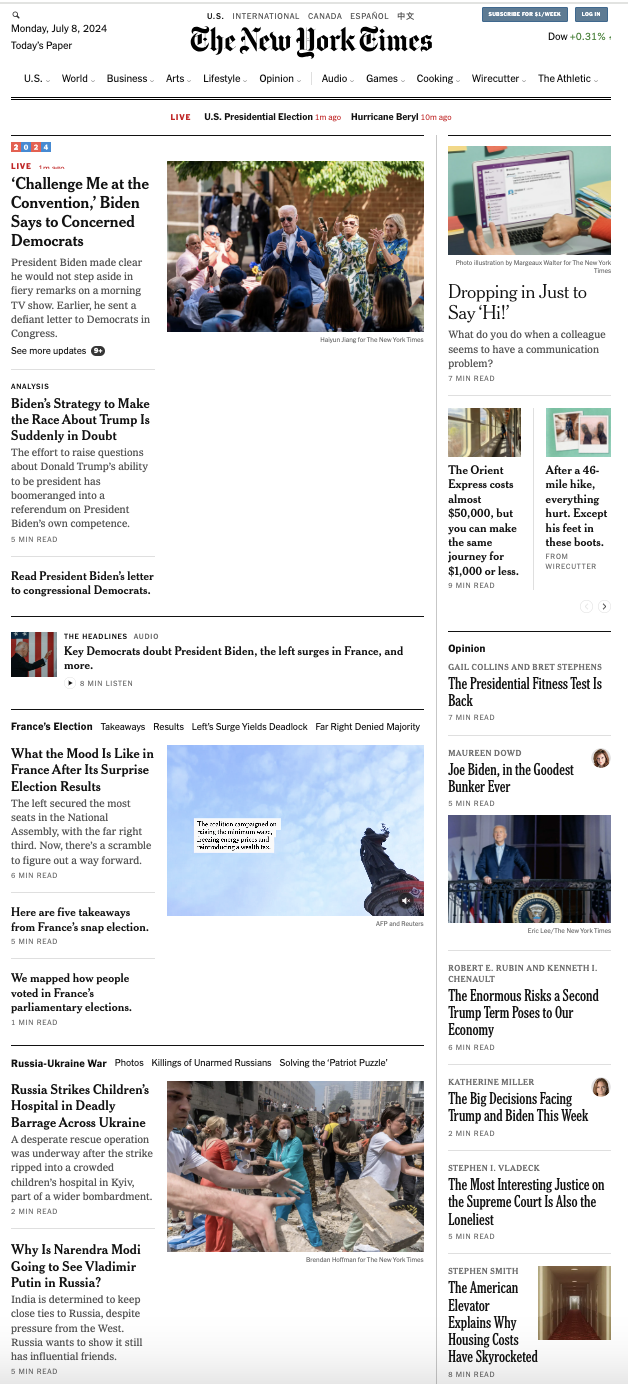
Screenshot of The New York Times by the IMI
The article describes the damage and losses caused by the Russian missile strike. “Ukraine’s largest children’s hospital was destroyed by a Russian missile … Shortly after an explosion tore through it, a woman carrying a small child covered in dust and blood emerged near the entrance,” the authors write.
The report outlines the situation in “Okhmatdyt” following the rocket attack and includes comments from witnesses – doctors and mothers. It is also noted that the hospital was hit by a Russian Kh-101 missile. The authors did not quote Russian propaganda.
CNN
The top news on the American TV channel’s website on July 8 was about the elections in France and the US. Missile attacks on Ukraine made it to the day’s main news. As of 20:00 Kyiv time, the Ukraine article ranked eighth among the most read. Early on July 9, it ranked second. The article had the headline “Ukrainian children’s hospital attacked as Russian strikes on cities kill at least 31“. The text saw several updates later as the casualties were growing and the headline was changed to: “Ukrainian children’s hospital attacked as Russian strikes on cities kill at least 43”.
The article’s authors are Svitlana Vlasova, Daria Tarasova-Markina, Maria Kostenko, Victoria Butenko and . Eleven more people are credited as contributors: Fred Pleitgen, Claudia Otto, Stephanie Halasz, Ivana Kottasova, Gianluca Mezzofiore, Benjamin Brown, Sahar Akbarzai, Sugam Pokharel, Niamh Kennedy, Eve Brennan and James Frater from CNN. The report features a photo by Gleb Garanich from Reuters.
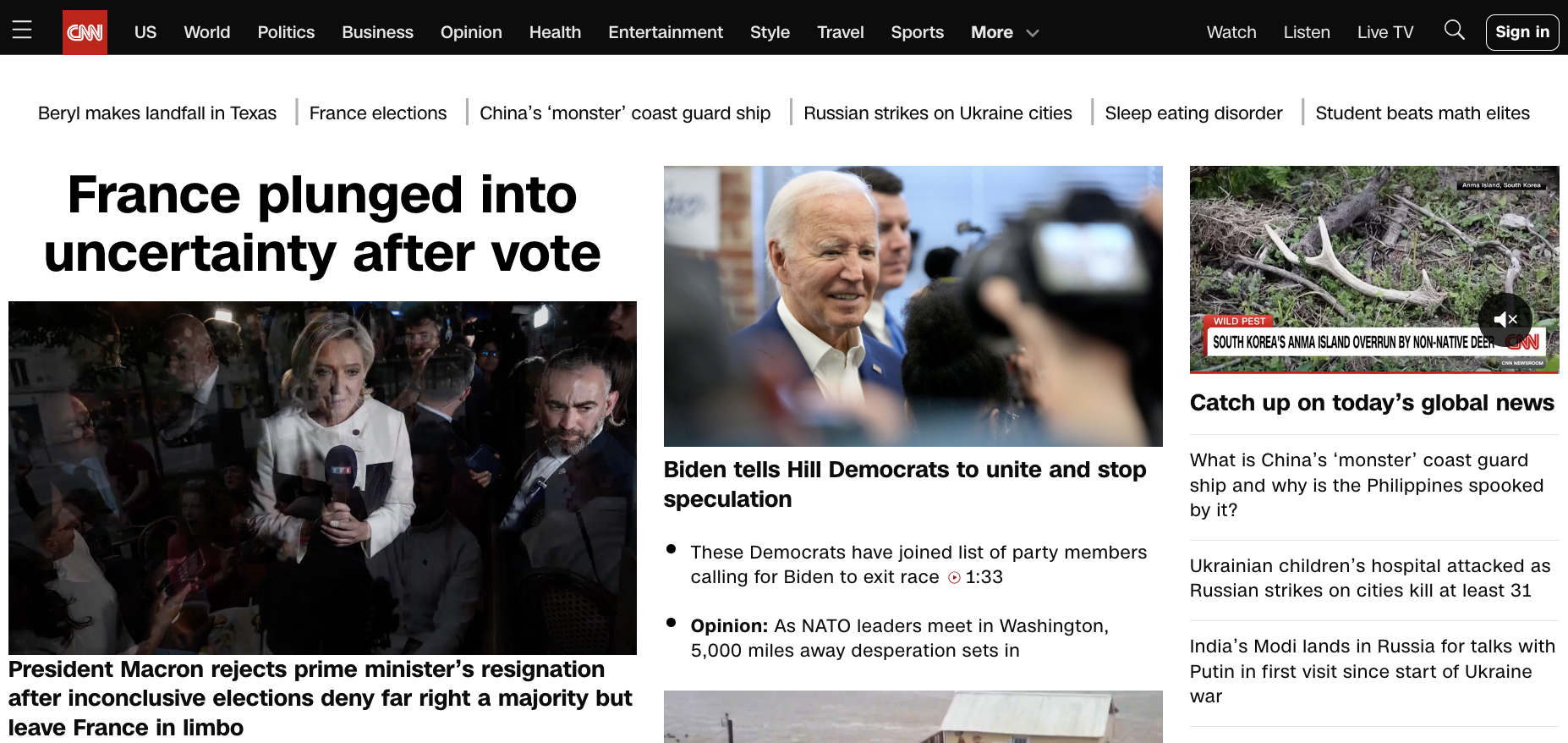
Screenshot of the CNN by the IMI
“A Russian missile strike partially destroyed a children’s hospital in Kyiv on Monday, forcing terrified patients and their families to flee for their lives,” the CNN story opens. The article explains that “Okhmatdyt” is the largest children’s medical center in Ukraine and is crucial for the treatment of some of the sickest children from all over the country.
Part of the article is reporting on the ground and includes comments from hospital staff and mothers of the children who were being treated here.
Another part is the response to the missile attack from Britain’s new Prime Minister Keir Starmer, French officials, and a mention that the UN Security Council will hold a special meeting to discuss “Russia’s deadly strike on a children’s hospital.” The text also included the statement by Russia’s Ministry of Defense, who claimed that Moscow had struck “military industrial facilities of Ukraine and air bases of the Ukrainian armed forces” using long-range, high-precision weapons.
ASSOCIATED PRESS
To the American news agency, one of the world’s largest outlets, the US elections were the main topic for July 8. The missile attack on Ukraine made it to the list of the day’s main events. The news was published under the headline “Dozens are killed as Russia bombards Ukraine. Among the buildings hit was a Kyiv children’s hospital“. The text was updated several times, and the final headline mentioned that this was Russia’s largest attack in the last four months, in which a children’s hospital was hit.
Hanna Arhirova and Illia Novikov are listed as authors, with Samya Kullab credited as a contributor. The material is illustrated with photos from Kyiv taken by the AP photographers Alex Babenko, Efrem Lukatsky, Anton Shtuka, Yevhen Maloletka.
“Russian missiles blasted cities across Ukraine on Monday, damaging the country’s largest children’s hospital and other buildings in a fierce assault that interrupted heart surgeries and forced young cancer patients to take their treatments outdoors,” the Associated Press article says. The report also contains testimonies by the victims.
The article includes a map of Kyiv with the spots hit by missiles: a residential building, a private clinic on the left bank, a children’s hospital next to a factory (the latter two are marked by one explosion sign on the map).
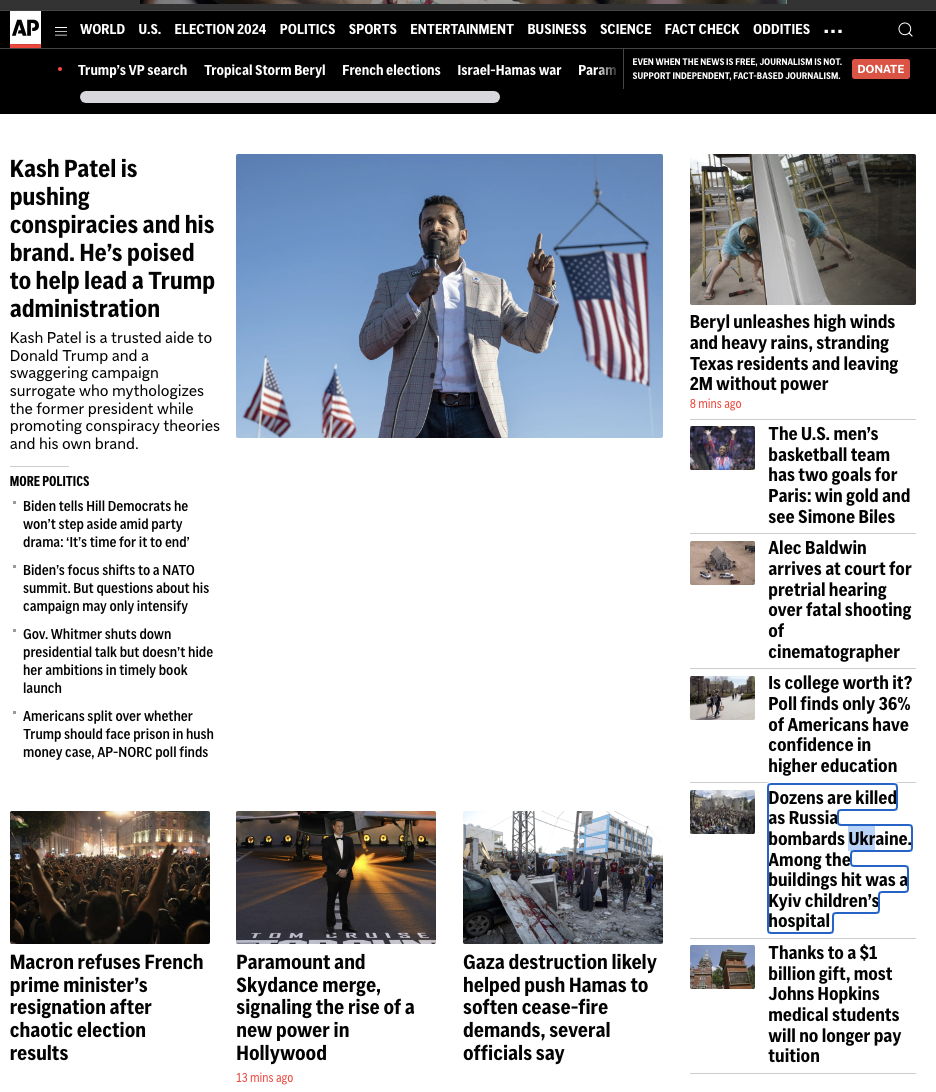
Screenshot of the Associated Press by the IMI
The news piece features the responses from Ukrainian officials and representatives of Western countries and international organizations. The Russian MoD’s denial of having targeted civilian objects with missiles is accompanied by a remark that the claims that the damage was caused by a Ukrainian air defense missile lack evidence. This is followed by a separate paragraph saying: “Since early in the war that is well into its third year, Russian officials have regularly claimed that Moscow’s forces never attack civilian infrastructure in Ukraine, despite abundant evidence to the contrary, including Associated Press reporting.”
The Associated Press also quotes the International Criminal Court’s founding charter, which says it is a war crime to intentionally attack “hospitals and places where the sick and wounded are collected, provided they are not military objectives.” The outlet also reminds that late last month, the court issued arrest warrants for Russia’s former defense minister and its military chief of staff for attacking Ukraine’s electricity network.
BBC
Britain’s public broadcaster placed the missile attack on Ukraine at the top on its website. What’s more, the news was updating live during the day, and the material had the headline “Kyiv children’s hospital hit as Russian daytime strikes on Ukraine kill dozens“.
In total, the material contained 31 separate reports, all of them edited by Johanna Chisholm, and the news from the ground were signed as reports by Kyla Herrmannsen from Kyiv. There are also reports by the Ukraine correspondent James Waterhouse and Zhanna Bezpiatchuk from the BBC Ukrainian service. Some of the reports were prepared by the Moscow correspondent Steven Rosenberg and the Russian BBC Monitoring editor Vitaliy Shevchenko. The material uses photos by Reuters, multiple stock platforms and photo agencies.
The reports explain that the children’s hospital “Okhmatdyt” is the largest pediatric institution in Ukraine and include comments by doctors and mothers.
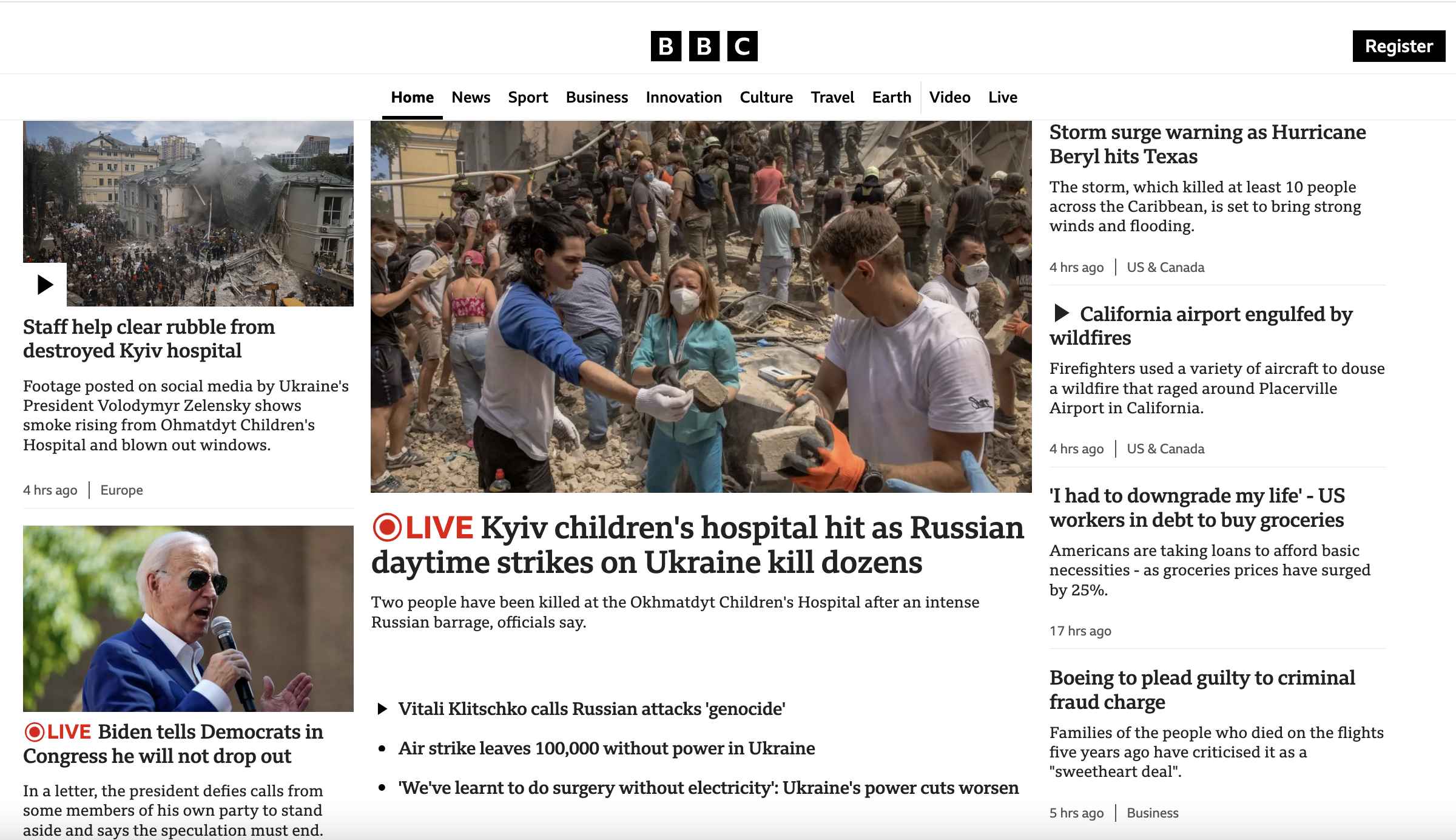
Screenshot of the BBC by the IMI
The featured responses to the missile attack include quotes from several Ukrainian officials, British Prime Minister Keir Starmer and Foreign Minister David Lammy, who condemned “attacking innocent children” and “most appalling attack on Ukrainian civilians,” respectively. There is also a statement from the UN, which says that under international humanitarian law, hospitals have special protection.
Next, the outlet refutes Russia’s claims that the Russian military had only targeted “Ukrainian military industrial sites and air bases” and the MoD’s blaming of the destruction in Kyiv on Ukrainian air defences. In the same message, author Steven Rosenberg adds that last Friday he to Russian President Vladimir Putin claiming to support the idea of a “diplomatic resolution” to the war in Ukraine. “Just three days later, this: one of the most devastating Russian strikes on Ukraine in months. Quite a contrast,” concludes Rosenberg.
GUARDIAN
The top news in the British news outlet was the election in France, followed by the missile attack on Ukraine. The article was first published under the headline “Kyiv Children’s Hospital hit as Russian missile attack kills at least 29 in Ukraine“; the text was later edited, and the headline changed to “Leaders condemn Russian missile attacks that killed 36 across Ukraine”. Pjotr Sauer and Artem Mazhulin are listed as the authors.
“The Guardian witnessed many young cancer patients in distress during the evacuation, some barely clothed and with medical tubes still attached to them,” says the article and quotes a nurse’s comment.
The responses to the missile attack include quotes from Ukrainian officials and representatives of some Western countries and organizations that condemned Russia’s actions.
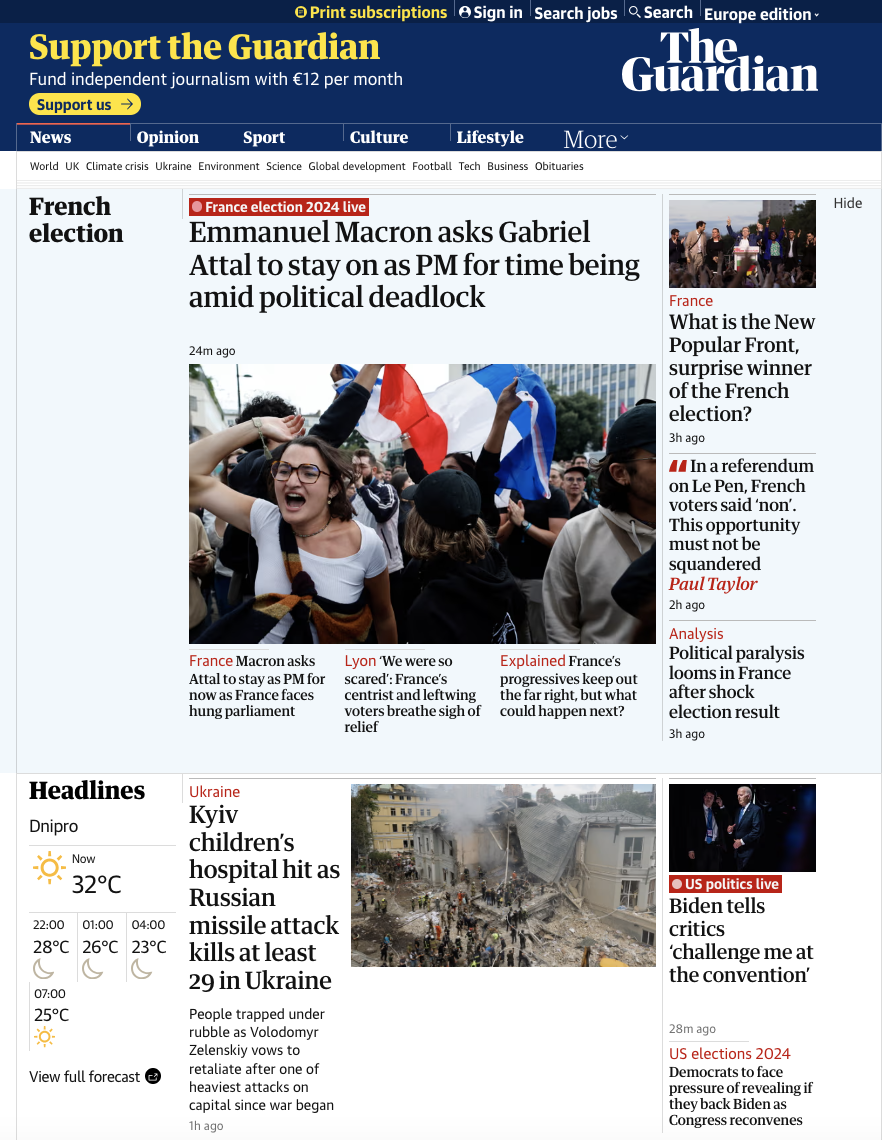
Screenshot of the Guardian by the IMI
Russia’s position is presented as follows: “Russia, which has targeted civilian infrastructure throughout the war, denied responsibility for deaths on Monday. In a statement, the defence ministry attributed the incident, without directly referencing the hospital blast, to Ukrainian anti-aircraft missiles, despite visual evidence that appeared to point to a Russian strike.”
The report by Pjotr Sauer from “Okhmatdyt” was published by the Guardian as a separate article under the title “‘No words for this’: horror over Russian bombing of Kyiv children’s hospital”. In this material, “witnesses express shock and revulsion after deadly missile strike on Ukraine’s largest paediatric clinic.”
On the morning of July 9, events in and around Ukraine made it to the Guardian’s top news. It was no longer a stand-alone report, but a live feed compiling all the latest updates. A brief summary of the previous day opened as follows: “There will be a lot of diplomacy in the coming days, including the NATO summit in Washington and the UN Security Council meeting in New York – two gatherings that will be dominated by Russia’s missile attacks on Ukraine on Monday. These strikes were among the heaviest the capital, Kyiv, had seen, and reduced parts of the country’s main children’s hospital to rubble, forcing critically ill patients to evacuate.”
REUTERS
The British news agency made the missile attack on Ukraine top news on July 8. Several articles were devoted to this topic.
The main one is “Russian missile attack kills 36, hits children’s hospital, Ukraine says“. The news was edited as the number of casualties grew. The reporting was done by Olena Harmash and Max Hunder, Anastasiia Malenko, Yuliia Dysa, Oleksander Kozhukhar, Kanishka Singh and Emma Farge, with Tom Balmforth, Ron Popeski, Cynthia Osterman, and Christopher Cushing also working on the article.
The summary cites officials as saying that a missile hit a children’s hospital in Kyiv and that missiles damaged infrastructure, commercial and residential buildings. The article opens with the sentence: “Russia blasted the main children’s hospital in Kyiv with a missile in broad daylight on Monday.” Reuters also quotes comments by witnesses of the strike.
The outlet cites the responses from both Ukrainian and Western officials. Russia’s position is given with a clarification from the authors: “Moscow has repeatedly denied targeting civilians and civilian infrastructure, although its attacks have killed thousands of civilians since it launched its invasion in February 2022.”
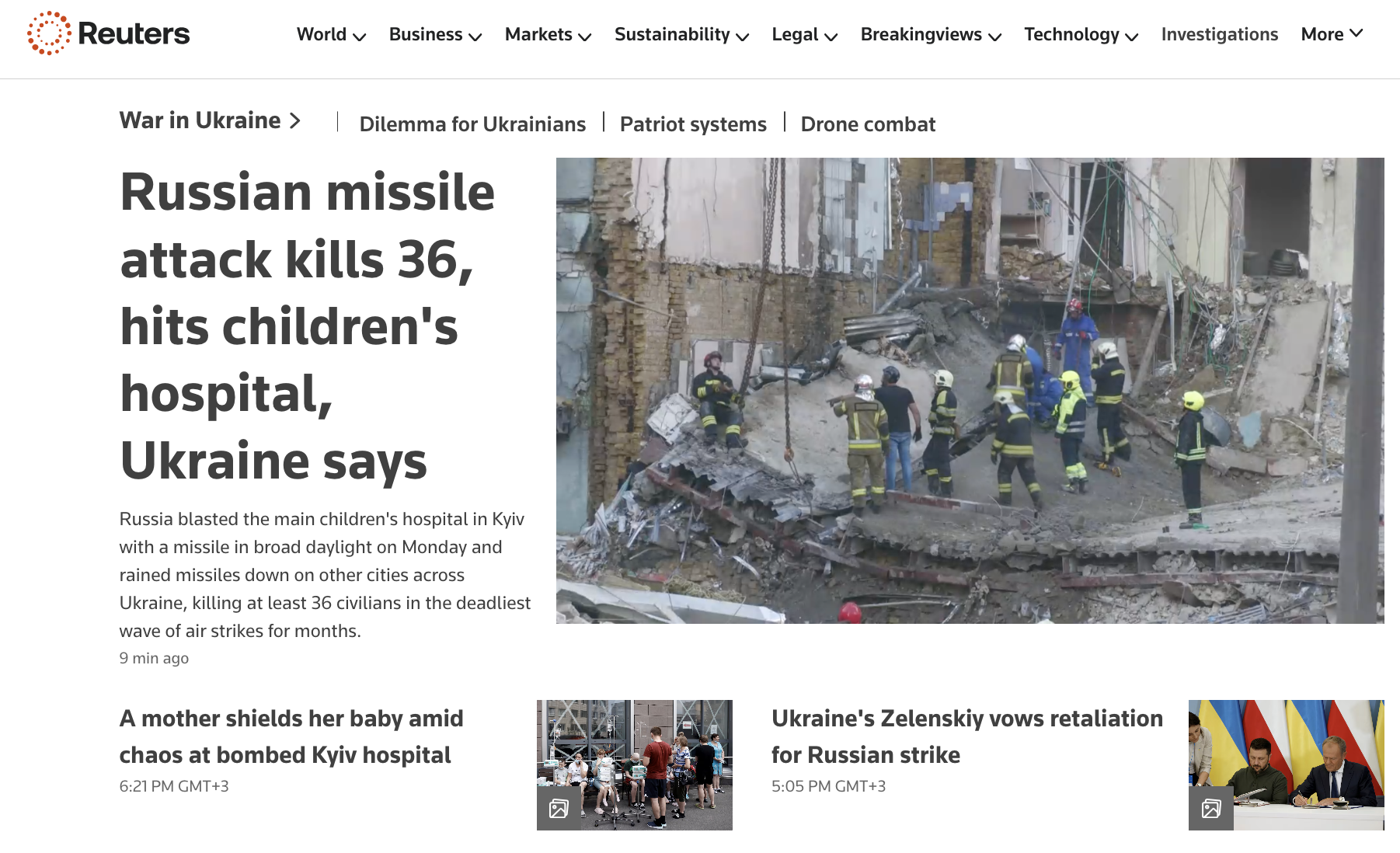
Screenshot of REUTERS by the IMI
euters reports Russia’s position in a separate news story “Russia says it hit defence targets, aviation bases in Ukraine“, which, for some reason, does not mention that the Kremlin’s previous denials of civilian deaths contradicted actual death toll among Ukrainian civilians.Instead, the outlet cited Moscow’s statement and noted that the Russian missile attack on Ukraine was “retaliation for attacks on Russia.” The news story is by Lucy Papachristou, Hugh Lawson and Philippa Fletcher.
Reuters also released a separate a report from “Okhmatdyt” by Max Hunder: “A mother shields her baby amid chaos at bombed Kyiv hospital“, with contributions by Dan Peleschuk, Ros Russell, Mike Collett-White and Jon Boyle. The material features photographs by Thomas Peter, including pictures of children and their mothers sitting in the open air. “Moments after a Russian missile smashed into a Kyiv hospital where her infant son was being treated, Svitlana Kravchenko rushed to cover the two-month-old with a cloth in order to protect him from the debris and dust in the air,” the report reads.
The article contains various testimonies by the victims and notes that around 600 children children are treated at the institution at any one time.
“Russia says it does not target civilians but thousands, possibly tens of thousands, have been killed since the full-scale invasion began in February 2022 … Footage verified by Reuters showed a missile flying in a steep trajectory towards the hospital grounds at high speed, in what appeared to be a direct hit. Ukraine said the ordnance used in the attack was a Kh-101, a cruise missile,” the report reads.
AL JAZEERA
On July 8, the Qatari international television company posted an article titled “Israeli attacks across Gaza kill 40 in a day, force thousands to flee” as the top news on its website. The story about the missile attack on Ukraine was posted with the headline “Children’s hospital attacked as 31 killed in missile strikes across Ukraine“. The material is a selection of news, updated in real time. A total of 53 news items were published; most were written by Umut Uras, with Mansur Mirovalev reporting from Kyiv in two.
The editors opened their live feed with official announcements by Ukraine’s authorities and photos of “Okhmatdyt” taken by Reuters’ Gleb Garanich, followed by reactions by officials from the EU, Great Britain, France, Italy, the Netherlands, Poland, and the UN.
In the same news feed, the editors posted a report about shelling in Belgorod. “Two civilians have been killed and three more injured after Ukrainian artillery shells hit a village in Russia’s Belgorod border region, according to Governor Vyacheslav Gladkov,” the news reads.
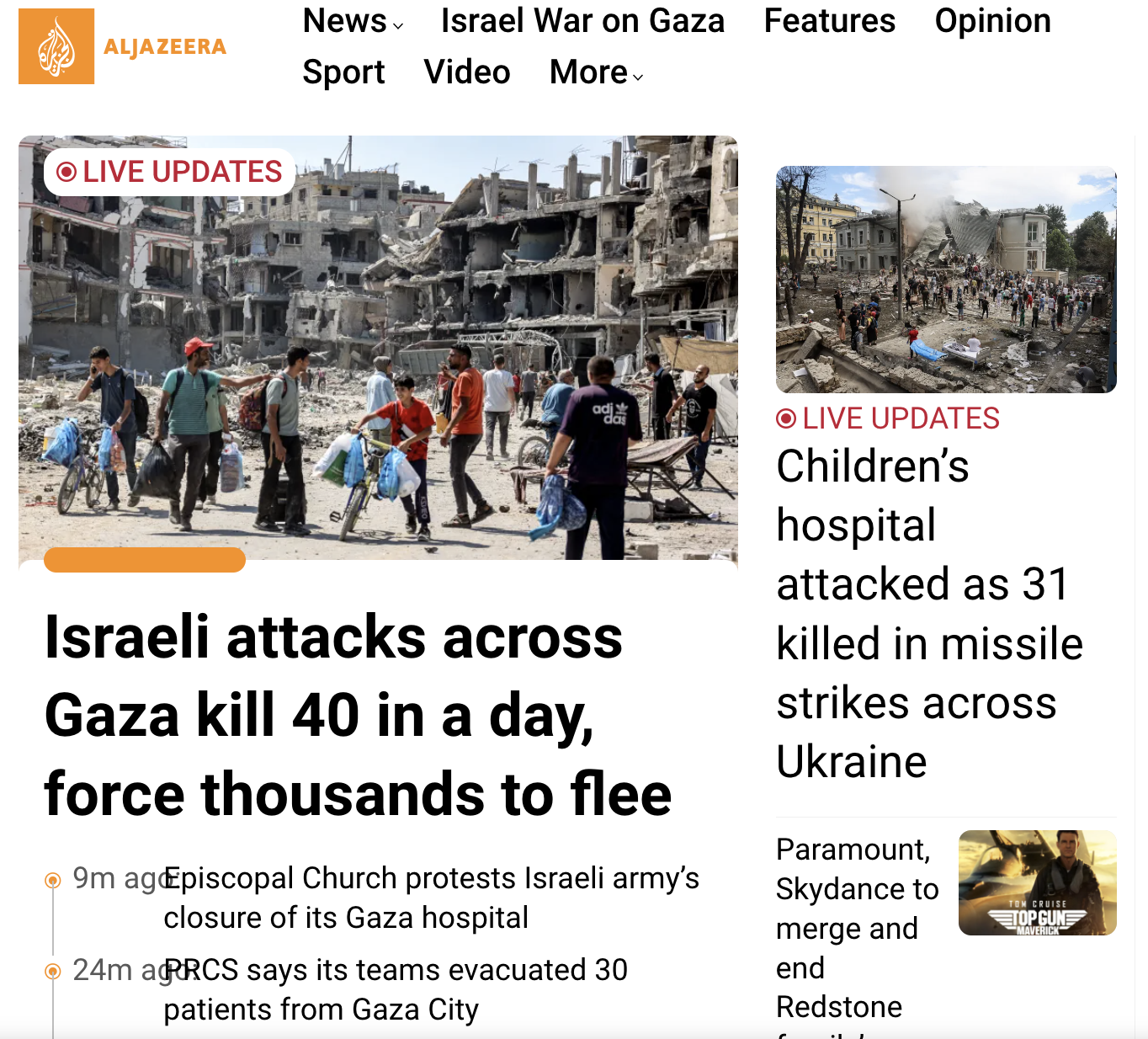
Screenshot of Al Jazeera by the IMI
Of the over 50 news pieces about the strike, only one is labeled in red as “breaking”. It features Russia’s denial of targeting civilian infrastructure. “Numerous published photos and video footage from Kyiv clearly confirm the fact of destruction due to the fall of a Ukrainian air defence missile launched from an antiaircraft missile system within the city,” Al Jazeera quotes the Russian Ministry of Defense as saying. This news includes a photo of rescuers working in the destroyed “Okhmatdyt” building. The next news item also features quote from Russia about striking defence industry targets and aviation bases in Ukraine. This time, the photo attached depicts “Okhmatdyt” victims, captioned: “People shelter in the basement following Russian missile strikes on Okhmatdyt children’s hospital in Kyiv.”
A separate news story penned by Mirovalev is about witnesses who spoke to the Al Jazeera representative about four powerful blasts at the Artem military plant. On the same day, Al Jazeera published a separate report by Mirovalev under the headline “As Ukraine’s largest children’s hospital is hit, anger towards Russia rages“. In this report, construction engineer Serhiy says: “Those were hits, not midair collisions.” Still, he is presented as a witness of a missile hitting the Artem military plant, and the report notes that the plant is located 1 km away from “Okhmatdyt”.
The report features comments by victims and explains that “Okhmatdyt” is the largest children’s hospital in Ukraine, which was hit by a “Russian hypersonic missile”. The report also cites the position of the Russian Ministry of Defense, who claims that the destruction of the hospital was caused by the fall of a Ukrainian anti-aircraft missile. The former deputy head of the General Staff of the Ukrainian Armed Forces, Lieutenant General Ihor Romanenko, is also quoted as saying that the attack on “Okhmatdyt” was deliberate. “They struck Okhmatdyt to hit a nerve, so that Ukrainians, Kyivans get emotional and pressure their leaders to agree with a Kremlin-proposed plan that would force Ukraine to recognise Moscow-occupied parts of Ukraine and Crimea as parts of Russia,” he said in his comment to Al Jazeera.
LE FIGARO
The main topic of the French newspaper on July 8 was the election in France. It was immediately followed by Ukraine: the news had the headline “War in Ukraine: massive Russian strikes on Ukrainian cities, dozens of deaths“, the authors not specified.
The Russian missile attack is described in one paragraph: “Russia carried out a massive attack on cities in Ukraine on Monday, which killed at least 36 people, some of them in hospitals, sparking Kiev’s outrage and support, on the eve of a major NATO summit. These new strikes also raise questions about the state of Ukrainian anti-aircraft defence, which has again been under severe strain after previous Russian bombings, including the targeting of power stations and military airfields.”
As you can see, there is no mention of “Okhmatdyt” or even that it was a children’s hospital that got destroyed. The children’s hospital is only mentioned in the next paragraph, which describes Zelensky’s response to the missile strike. Still, there is no explanation as to what kind of hospital it is, that it is the largest one in Ukraine, that it works, that surgeries were being carried out in it at the moment of the strike.
Le Figaro reports on the response from the international community: France, the United States, the United Nations, and the United Kingdom. All of them condemn the missile attack on civilian objects, including a children’s hospital. The British diplomat’s response makes a mention of “Okhmatdyt”.
Russia’s reaction is not mentioned. Instead, there is news of the visit of India’s Prime Minister to Moscow.
Later, another article appeared on the Le Figaro website: “Ukraine: Volodymyr Zelensky Swears to Respond to Russia’s Massive and Deadly Attacks“. Georges Malbrunot is listed as the author. The news article quotes a post by Volodymyr Zelensky about the impact of the Russian missile strike, which affected Kyiv, Dnipro, Kryvyi Rih, Slovyansk and Kramatorsk: “Housing buildings, infrastructure and a children’s hospital, one of the largest in Europe, have been damaged.”
Here the author does note that the children’s hospital “Okhmatdyt” came under fire. Russia’s denial of their involvement in the attack is also mentioned, as well as Russia’s claims that the damage was caused by the fall of Ukrainian anti-aircraft missiles. Moscow’s position is refuted by Ukrainian special services, which claim that “Okhmatdyt” was hit by a Kh-101 missile, adopted in 2014.
This news contains a response by the EU chief diplomat Josep Borrell, France, and the United Kingdom.
***
The analysis of international news reports on the “Okhmatdyt” missile attack showcased different approaches to covering the event and refuting Russia’s disinformation about it. Some outlets provided more detailed and immediate coverage, including refutations of Russia’s claims, while others only mentioned the attack in passing or reported on it with a delay.
Not all Western media promptly and accurately covered the missile attack on ‘Okhmatdyt’. The BBC, the Associated Press, and Reuters did the best in this regard, not only reporting the news promptly, but also clearly refuting Russia’s fake claims. Other media outlets such as The New York Times, The Washington Post, Al Jazeera, Le Figaro, did not pay sufficient attention to this incident and to refuting Russia’s statements, which may indicate the editors’ other priorities.
Ihor Yakuba, IMI media expert

